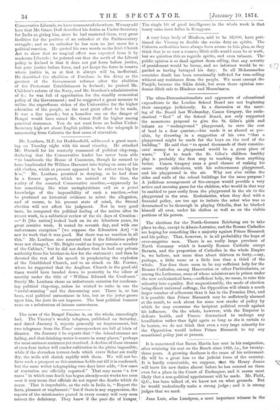Mr. Leatham, M.P. for Huddersfield, addressed a great meet- ing
on Tuesday night with his usual vivacity. He attacked Mr. Disraeli for his masterly command of political clap-trap, declaring that the Conservative leader has never been able "to bamboozle the House of Commons, though he seemed to have bamboozled Sir William Harcourt into trying on some of his old clothes, which at present appeared to be rather too big for Win." Mr. Leatham persisted in denying, as he had done in a former speech, which we noticed at the time, the reality of the asserted Conservative reaction,—apparently he has something like what metaphysicians call an a priori knowledge of the impossibility of such a reaction,—but he produced no historical evidence to rebut the allegation, and of course, in his present state of mind, the Stroud election will not affect his judgment. Not in very good taste, he compared the political feeling of the nation after its recent work, to a sabbatical review of the six days of Creation : —" It [the nation] looked back on its six laborious years, its great creative week. It rested its seventh day, and with one unfortunate exception" [we suppose the Education Act] "it saw its work that it was good. But there was no reaction in all this." Mr. Leatham also asserted that if the Education policy were not changed, "Mr. Bright could no longer remain a member of the Cabinet," but he did not declare that he had any private authority from his brother-in-law for the statement ; and then he devoted the rest of his speech to prophesying the explosion of the Established Church, and to an attack on Mr. Forster, whom he suggested that the Anglican Church in the good old times would have handed down to posterity in the odour of sanctity under the title of "William Edward the Confessor." Surely Mr. Leatham chose an unfortunate occasion for condemn- ing political clap-trap, unless he wished to unite in one the " awful-warning " and the denouncing seer. There is, or has been, real political earnestness in him, but as the jester grows upon him, the jests do not improve. The best political humour rests on a substratum of intense earnestness.


































 Previous page
Previous page